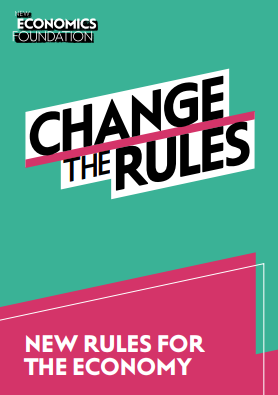Talking Points: November 2019
Posted on 04 Dec 2019 Categories: Blog, Climate crisis, Local initiatives, Talking Points, The business we want, The society we want
by Rethinking Poverty
This month’s Talking Points focuses on the way our economy works: the role of business in society, Wales’s ground-breaking Foundational Economy model, and the primacy of the local, for tackling the climate emergency among other things. We end with some bad news about poverty and some good news/reflections about the power of public protest.
Rethinking the role of business in society
The UK ‘has a particularly extreme form of capitalism’, reports Simon Jack for the BBC. We urgently need to rethink the role of business in society, he says. Among other things, we need to ‘rewrite the Companies Act to specifically enshrine directors’ duties to other stakeholders in law’. Currently, the Act says that other stakeholders’ interests are subordinate to those of shareholders.
‘Even capitalists think the current model of capitalism is in trouble,’ says Michael Jacobs, and we cannot get out of it by carrying on as before. ‘Read the Economist and the Financial Times, or listen to business leaders in the CBI and the Federation of Small Businesses,’ he says.
In the US, Democratic presidential candidate Elizabeth Warren aims to create a new generation of great US stakeholder companies, complete with empowered workforces represented on boards, who would be bound by law to take their responsibilities to consumers, suppliers and the environment fundamentally seriously’. She advocates an interlinked series of initiatives to lower and eliminate carbon emissions, in areas ranging from agriculture to transport, in support of the Green New Deal.

While politicians like Warren are trying to change the system, workers are trying to change their companies. More than 1,000 Google workers have signed a public letter calling on their employer to commit to an aggressive ‘company-wide climate plan’ that includes cancelling contracts with the fossil fuel industry and halting its donations to climate change deniers. This follows similar efforts by employees of Amazon and Microsoft. Workers across the tech industry participated in the global climate strike on 20 September.
New economic approaches
 Wales will be the first country in the world to embrace the ‘Foundational Economy’ approach, which says that public policy must not focus on private consumption to deliver economic growth but rather the quantity and quality of vital services and goods. To support the model, reports New Start magazine, 27 projects in the Welsh Valleys will share £2.2 million to improve local economies.
Wales will be the first country in the world to embrace the ‘Foundational Economy’ approach, which says that public policy must not focus on private consumption to deliver economic growth but rather the quantity and quality of vital services and goods. To support the model, reports New Start magazine, 27 projects in the Welsh Valleys will share £2.2 million to improve local economies.
The New Economics Foundation has published New rules for the economy, which puts forward over 100 policy proposals to help the next government tackle our three great crises: economic, ecological and democratic.
A strong focus on the local
CLES – the Centre for Local Economic Strategies – has published its own Manifesto for Local Economies. ‘In our local economies, too many people, places and communities are being left behind, and for CLES, this demands a new social contract with action across the four key themes of our manifesto for local economies: wealth, people power, public services and climate emergency.’ This change cannot happen piecemeal, says the Manifesto. ‘The new government must address all four themes in order to achieve social, economic and environmental justice for all people and places.’
For real change, Labour should ditch its top-down thinking, writes the Guardian’s John Harris. ‘Doing determinedly local things outside old orthodoxies creates space for innovation, makes people participants instead of recipients and often succeeds where more traditional approaches fail,’ he says. ‘The way places are run could start with something that the burgeoning localist movement, Flatpack Democracy, has made clear: the optimum population size for meaningful grassroots democracy is between 10,000 and 50,000.’ The left-inclined pressure group Compass calls the ideal model of modern politics ‘45° change’. This is the point where ‘horizontal’ local activity is complemented by the help of the ‘vertical’ state.
NEF has also launched a new website, Change the Rules, which maps inspiring local, community and workplace initiatives to build a more democratic and sustainable economy, and showcases the policies to make it happen.
Tackling the climate emergency needs local approaches
Two leading think tanks, Localis and Green Alliance, have warned the government to fast-track more local industrial strategies in order to help regions move to a zero-carbon economy. Meanwhile in Hackney, the council is set to launch a local energy company, to be called Hackney Light and Power. The company will be run by the local authority and will play a key role in delivering the council’s decarbonisation targets.
Bad news on poverty
This isn’t a heading we like to include in Talking Points, but there is so much it seems wrong to ignore it. Much of this is coming in the form of warnings in the run-up to the general election. Retention of the two-child benefit limit will push hundreds of thousands into deeper poverty, MPs on the Work and Pensions Select Committee warn in their final report before the dissolution of parliament. Welfare changes are driving rising poverty and food bank use, according to the State of Hunger 2019 report, compiled by Heriot-Watt University academics for the Trussell Trust.
‘There Is No Safety Net‘, reports Billy Briggs in the Huffington Post. He describes how austerity has hit Fife, one of Scotland’s poorest communities. A 2018 report by End Child Poverty said that across the region 24.47 per cent of children are growing up in poverty, with 36.68 per cent in one ward. The number of UK children in need of shoe donations is increasing, according to Sal’s Shoes, a British charity that distributes children’s shoes to those living in poverty around the world.
Good news on the power of public protest
The Metropolitan Police’s use of a Section 14 order to try to halt Extinction Rebellion protests across London in October has been ruled illegal by the high court. ‘This judgment is a timely reminder to those in authority facing a climate of dissent,’ said Jules Carey of solicitors firm Bindmans. ‘The right to protest is a longstanding fundamental right in a democratic society that should be guarded and not prohibited by overzealous policing.’

Fracking is finished in the UK – thanks to the power of public protest, writes Anna Vickerstaff. ‘For eight years, local communities have led this fight. Since work started in Lancashire, 1,032 days ago, local people have been at the gates every single day. From Balcombe to Blackpool, Sherwood to Ryedale, people power has defeated the fracking industry before it got off the ground. This victory is one of the biggest the climate movement has ever seen.’ Some fear that what is at this stage only a moratorium could be reversed, but Vickerstaff isn’t one of them. ‘Make no mistake, this is a huge win for local campaigners and the final nail in the coffin of the fracking industry in the UK.’
Posted on 04 Dec 2019 Categories: Blog, Climate crisis, Local initiatives, Talking Points, The business we want, The society we want
